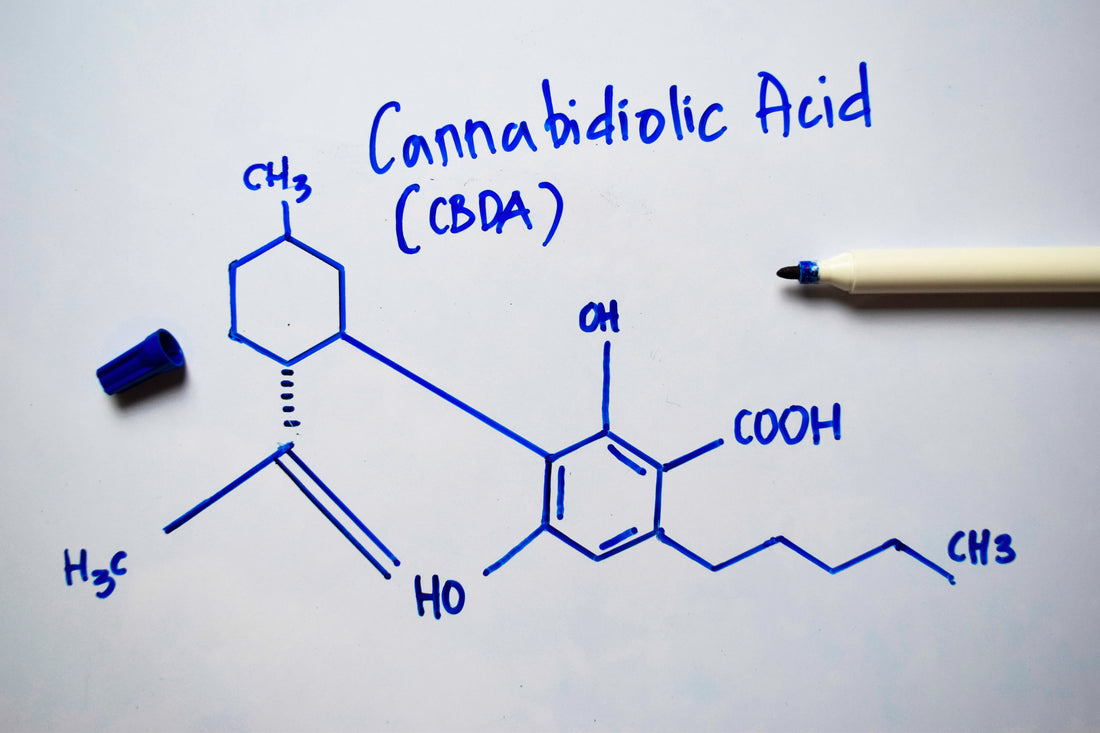
What is CBDA? Unlocking the Secrets of Cannabidiolic Acid
In the vast world of cannabinoids, there's a lesser-known but equally intriguing compound called CBDA, or cannabidiolic acid. While CBD has gained significant attention for its potential benefits, CBDA is its raw, unprocessed precursor, found in the cannabis plant before it undergoes any form of heating or decarboxylation. As interest in the therapeutic potential of cannabinoids grows, CBDA is emerging as a compound worth understanding in its own right. This article delves into what CBDA is, how it differs from CBD, and why it's becoming a focal point in cannabinoid research.
The Basics: What is CBDA?
CBDA, or cannabidiolic acid, is a natural cannabinoid found in the raw cannabis plant, particularly in hemp varieties. It’s the acidic precursor to CBD (cannabidiol), meaning that it’s the form CBD takes before it is exposed to heat or prolonged storage. In fresh cannabis plants, cannabinoids exist in their acidic forms, such as CBDA, THCA (tetrahydrocannabinolic acid), and others. These acidic forms are often referred to as the raw versions of cannabinoids.
When cannabis or hemp is heated through smoking, vaping, or cooking, CBDA undergoes a chemical process known as decarboxylation. This process removes a carboxyl group from the molecule, transforming CBDA into CBD, the compound that is more widely recognized and used. While CBD and CBDA share similarities, they interact with the body in different ways and may offer distinct benefits.
How Does CBDA Work?
CBDA interacts with the body’s endocannabinoid system (ECS), but it does so differently than CBD. The ECS is a complex network of receptors and enzymes that plays a crucial role in maintaining homeostasis—or balance—in the body. The two primary receptors in the ECS are CB1, found mainly in the brain and central nervous system, and CB2, located primarily in the immune system and peripheral organs.
Unlike CBD, which interacts more directly with the ECS, CBDA is thought to exert its effects by influencing enzymes and other non-cannabinoid receptors in the body. One of the key targets of CBDA is the 5-HT1A serotonin receptor, which is involved in regulating mood, nausea, and other physiological functions. This interaction suggests that CBDA might offer unique benefits, particularly in areas related to mood regulation and overall well-being.
CBDA vs. CBD: What’s the Difference?
While CBDA and CBD are closely related, they are not the same compound, and their differences go beyond just their chemical structures:
-
Raw vs. Processed
- CBDA is found in raw, unprocessed cannabis plants. It is the natural, acidic precursor to CBD. When cannabis is heated, CBDA converts into CBD. This means that CBDA is typically present in raw cannabis juices, tinctures, or in dried cannabis before it is exposed to heat.
-
Interaction with the Body
- CBDA interacts with the body differently than CBD. While CBD is known for its broad effects on the ECS, CBDA’s influence on serotonin receptors sets it apart, potentially leading to different therapeutic applications.
-
Availability and Use
- CBD is widely available and used in various forms, including oils, capsules, edibles, and topicals. CBDA, on the other hand, is less common because it’s often converted into CBD during processing. However, interest in CBDA is growing, leading to the development of specialized products that retain this raw cannabinoid.
Why is CBDA Gaining Attention?
Although CBDA has not been as extensively studied as CBD, emerging research and anecdotal evidence suggest that it may offer unique benefits. Here are a few reasons why CBDA is becoming a topic of interest:
-
Potential for Supporting Mood and Well-Being
- CBDA’s interaction with serotonin receptors suggests that it may have a role in supporting mood balance. This could make it an intriguing option for those looking for natural ways to support their mental health and overall well-being.
-
Preserving the Full Spectrum of the Plant
- As more people seek out holistic, whole-plant remedies, CBDA is gaining attention as part of the full spectrum of cannabinoids that can be consumed in raw cannabis or hemp. Some believe that consuming cannabinoids in their raw form may offer additional benefits that are lost during processing.
-
The Entourage Effect
- The entourage effect refers to the synergistic relationship between various cannabinoids, terpenes, and other plant compounds when they are consumed together. Including CBDA in this mix may enhance the overall effects of a full-spectrum product, making it a valuable component of cannabis-based remedies.
-
Non-Psychoactive Nature
- Like CBD, CBDA is non-psychoactive, meaning it does not produce a "high" or alter the state of mind. This makes it appealing to those who are interested in the potential therapeutic effects of cannabinoids without the psychoactive effects associated with other compounds.
The Future of CBDA
As the understanding of cannabinoids deepens, CBDA is likely to become a more prominent focus of research and product development. Scientists are just beginning to explore the full range of its potential benefits, and future studies may unlock new applications for this raw cannabinoid.
For consumers, this could mean more options when it comes to choosing cannabinoid products, particularly for those interested in whole-plant or raw cannabis options. Whether used on its own or as part of a broader cannabinoid profile, CBDA may offer an additional tool for those seeking natural wellness solutions.
Conclusion
CBDA, the raw precursor to CBD, is an exciting and emerging cannabinoid with its own set of potential benefits. While it shares a close relationship with CBD, its distinct properties and interactions with the body make it a compound worth exploring. As research continues and interest in whole-plant medicine grows, CBDA may become an increasingly important part of the cannabinoid landscape, offering new opportunities for those looking to harness the power of cannabis in its most natural form. Whether you’re new to cannabinoids or looking to expand your knowledge, CBDA represents a fascinating and promising area of study in the quest for natural health and wellness.
